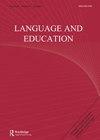‘I found comfort in Spanglish:’ translanguaging and the linguistic experiences of bilingual teacher candidates in rural California
IF 2.8
2区 文学
Q1 EDUCATION & EDUCATIONAL RESEARCH
引用次数: 0
Abstract
Abstract A new bilingual/plurilingual education renaissance in California was ushered in with the passage of state Proposition 58 in 2016. Program planners, however, have struggled to meet the need for bilingual/plurilingual teachers within a linguistic context ravaged by two decades of restrictive policies. This restrictionism has resulted in an entire generation of would-be bilingual teacher candidates growing up without formal academic support for bilingualism and biliteracy in their k-12 education. Although plurilingualism has been stymied in formal spaces, emerging research on translanguaging indicates that ‘bilinguals’ by definition creatively language within their various social and political milieu such that syntheses or hybrid forms of language emerge that reflect their full linguistic repertoire. This study examines the linguistic experiences of those who have overcome the odds to pursue their bilingual teacher certification. Through analysis of participant case studies of Latinx candidates studying for their bilingual teacher certification in California’s southern San Joaquín Valley, we find translanguaging to be a critical tool of identity expression, interethnic solidarity, and plurilingual/bilingual sustenance within a decidedly conservative and subtractive sociocultural and sociolinguistic context. We discuss the implications of these findings for the centering of translanguaging in bilingual teacher education and the cultivation of future bilingual/plurilingual educators in California.我在西班牙式英语中找到了安慰:加州农村双语教师候选人的跨语言和语言经历
摘要随着2016年58号州提案的通过,加州迎来了一场新的双语/多语言教育复兴。然而,在受到20年限制性政策破坏的语言环境中,项目规划者一直在努力满足对双语/多语言教师的需求。这种限制主义导致整整一代想要成为双语教师的候选人在k-12教育中没有正式的双语和双语学术支持的情况下成长。尽管多语言主义在形式空间中受到了阻碍,但新兴的跨语言研究表明,“双语者”在其各种社会和政治环境中创造性地使用语言,从而形成反映其全部语言谱系的综合或混合语言形式。这项研究考察了那些克服困难获得双语教师证书的人的语言经历。通过对在加利福尼亚州南部圣华金谷学习双语教师证书的拉丁裔候选人的参与者案例研究的分析,我们发现跨语言是在绝对保守和消减的社会文化和社会语言学背景下表达身份、种族间团结和多语言/双语支持的关键工具。我们讨论了这些发现对以跨语言为中心的双语教师教育以及加州未来双语/多语言教育工作者的培养的影响。
本文章由计算机程序翻译,如有差异,请以英文原文为准。
求助全文
约1分钟内获得全文
求助全文
来源期刊

Language and Education
Multiple-
CiteScore
4.70
自引率
0.00%
发文量
34
期刊介绍:
Language & Education provides a forum for the discussion of recent topics and issues in the language disciplines which have an immediate bearing upon thought and practice in education. Articles draw from their subject matter important and well-communicated implications for one or more of the following: curriculum, pedagogy or evaluation in education. The task of the Journal is to encourage language specialists and language in education researchers to organise and present their material in such a way as to highlight its educational implications, thereby influencing educational theorists and practitioners and therefore educational outcomes for individual children.
 求助内容:
求助内容: 应助结果提醒方式:
应助结果提醒方式:


